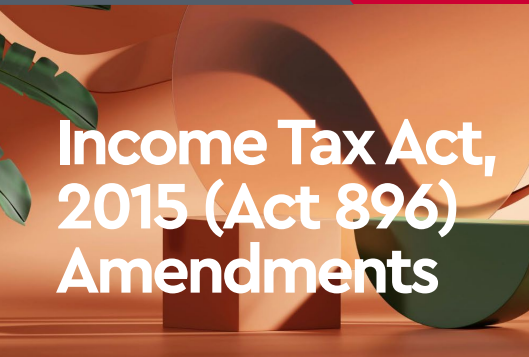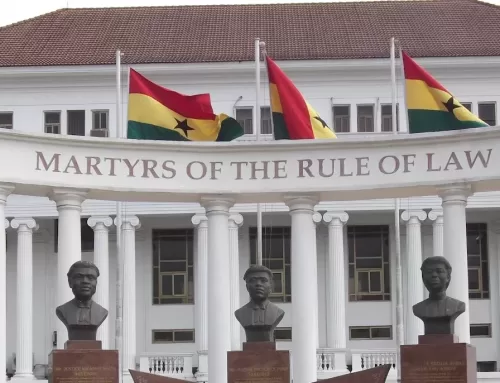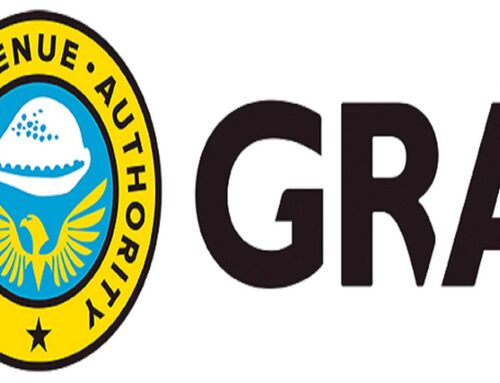Ghana has made an amendment to the Income Tax Act, 2015 (Act 896)
The Parliament of Ghana has passed the Income Tax (Amendment) Act 2023, Act 1094. The object of this amendment is to revise the rates of income tax for individuals and introduce an additional income tax bracket; introduce a withholding tax rate on the realization of assets and liabilities; unify the loss carried forward provisions regarding winnings from lottery; revise the treatment of foreign exchange losses; revise the taxable value for motor vehicle benefit; and increase the concessional income tax rates.
The Income Tax (Amendment) 2023, Act 1094 was assented to by the President and gazetted on 3rd April, 2023. The Commissioner-General issued a notice dated 27 April 2023 to the effect that the effective date of implementation of the amendment is 1 May 2023
In this alert, we highlight the key areas of the law below:
Minimum chargeable income
- The inclusion of the minimum tax rate of 5% of turnover for persons declaring losses for the previous 5 years.
- A person may be required to compute and pay tax on a minimum chargeable income of 5% of turnover where the person has been declaring losses for the previous 5 years of assessment total income.
- The minimum chargeable income, however, does not apply to a person within the first five years of the commencement of operations or a person engaged in farming.
Addition of winnings from lottery to income from investment
- The law now requires a person who is ascertaining the profits and gains of that person or of another person from an investment for a year of assessment to include in the calculations, winnings from lottery.
- A 10% withholding tax on gross game winnings must be withheld by lottery operators and paid to the Commissioner-General. The withholding tax is per each game winning and at the end of each game.
Unification of deduction of unrelieved loss
- The current amendment allows a person who is ascertaining the income of that person or of another person from a business for a year of assessment, to deduct an unrelieved loss of the person for any of the previous five years of assessment from the business. All unrelieved loss may be deducted for a period of 5 years.
- The five years deduction of unrelieved losses is applicable to all companies irrespective of the industry or section of operation.
Tax treatment of foreign exchange gains or loss
- When a person is ascertaining the income of a person for a basis period from any business, there shall be a deduction of any foreign currency loss other than a loss that is capital in nature incurred in the production of income during the period in respect of debt claim, debt obligation or foreign currency holding of that person.
- Any foreign exchange loss arising out of transactions that are capital in nature is now not allowed as a deduction, but rather capitalized and capital allowance may be granted accordingly.
- There is also a restriction on the deduction of foreign exchange loss associated with revenue transactions to only realized foreign exchange loss.
- A foreign exchange loss arising from a transaction between two resident persons shall not be allowed as a deduction.
Submission of return for gains on the realization of assets and liabilities
- Submission of tax returns in relation to realization of assets or liabilities is now required.
- A person who realizes an asset or a liability shall, within 30 days after the realization of the asset or liability, submit to the Commissioner-General a return in the form determined by the Commissioner-General.
Taxation of retirement fund
- A withdrawal from a provident fund or personal pension scheme before the statutory retirement age by
- An employee due to loss of permanent employment or
- A self-employed person from the personal savings account under the National Pensions Act, 2008 (Act 766)
due to the Novel Coronavirus pandemic or the current economic hardship is exempt from income tax for 2023.
Taxation of Lottery Operations.
- The income of a person from lottery operations is subjected to 20% corporate income tax
- The chargeable income of a person from a lottery operation has been defined to mean the gross gaming revenue.
- The gross gaming revenue of a person engaged in a lottery operation has been defined as the total amount staked or wagered less prizes or winnings paid or payable.
- Gross gaming revenue is the total amount staked or wagered less prizes or winnings paid or payable.
- When a person has chargeable income other than income from a lottery operation, the person shall be charged separately.
Withholding in relation to the realization of asset or liability
- Section 115 of the Income Tax Act 896, Act 2015 has been amended by the substitution for subsection 1.
- A resident person shall withhold tax at the specified rate where that person pays;
- Any dividend
- Winnings from lottery
- Interest
- Natural resource payment
- Rent or royalty to another person.
- Consideration to another person in respect of the realization of an asset or a liability and the payment has a source in the country.
- The new amendment has added withholding of tax for any consideration made to another person in relation to the realization of an asset or a liability.
- Also, to address assets or liabilities not covered by the aforementioned section, the amendment has inserted section 116A, which mandates the withholding of taxes from the consideration upon the realization of any other assets or liabilities.
- Now, withholding tax is applicable on realization (sale) of assets or liabilities. The rate applied on the consideration received is;
- 3% in case of a resident person; and
- 10% in case of a non-resident person
Free Zone Companies
- The chargeable income of free zone companies in the supply of goods and services to the local market after the end of the concessionary period will be taxed at the rate of 25%. Companies engaged in hotel business are excluded from this.
Rates of income tax for individuals.
- The highest tax rate for individuals has been increased from 30% to 35%.
- Again, the first tax band of an individual has been increased from GHS4,380.00 to GHS4,824.00.
- The chargeable annual income of a resident individual for a year of assessment is now taxed at the following rates;
| No. | Chargeable Income | Rate of Tax |
|---|---|---|
| 1 | First GHS 4,824.00 | Nil |
| 2 | Next GHS 1,320.00 | 5% |
| 3 | Next GHS 1,560.00 | 10% |
| 4 | Next GHS 36,000.00 | 17.5% |
| 5 | Next GHS 196,740.00 | 25% |
| 6 | Next GHS 359,556.00 | 30% |
| 7 | Exceeding GHS 600,000.00 | 35% |
From the annual tax rates, the monthly instalment rates are set out below:
| Rate | Next Chargeable income | Cumulative income | Tax | Cumulative tax |
|---|---|---|---|---|
| First | 0 | 402 | 0 | 0 |
| 5% | 110 | 512 | 5.50 | 5.50 |
| 10% | 130 | 642 | 13.00 | 18.50 |
| 17.5% | 3,000 | 3,642 | 525.00 | 543.50 |
| 25.0% | 16,395 | 20,037 | 4,098.75 | 4,642.25 |
| 30.0% | 29,963 | 50,000 | 8,988.90 | 13,631.15 |
| Exceeding | 35.0% | 50,000 |
- The chargeable income of a non-resident individual for a year of assessment is taxed at the rate of 25%
- Where an individual receives gains from realization of asset (investment), the individual may elect that the gain from the investment is taxed at the rate of 25%.
- Where an individual receives a gift from employment or business, the individual may elect that the gift is taxed at the rate of 25%
Rate of tax on persons entitled to concessions in the sixth schedule.
- The income of a person entitled to a concession in the sixth schedule is subject to tax at the rate of 5% of chargeable income.
- Persons engaged in agriculture, rural banking, providing residential premises, waste processing, unit trust scheme and mutual fund, and venture capital financing are on the list of the sixth schedule.
Motor vehicle benefits.
- The tax threshold for use of a motor vehicle provided by an employer to an employee has now been capped at the following rate.
- Driver and vehicle with fuel benefit is 12.5% of the person’s total cash emoluments, with a maximum limit of GHS 1,500.00 per month. This represents an increase from the previous tax threshold of GHS 600.00.
- Vehicle with fuel benefit is 10% of the person’s total cash emoluments, with a maximum limit of GHS 1,250.00. This represents an increase from the previous tax threshold of GHS 500.00.
- For vehicle only, the benefit is 5% of the person’s total cash emoluments, with a maximum tax limit of GHS 625.00 This represents an increase from the previous tax threshold of GHS 250.00.
- Fuel only, benefit is 5% of the individual’s total cash emoluments, with a maximum limit of GHS 625.00. This represents an increase from the previous tax threshold of GHS 250.00.
Takeaway
- The amendment was signed by the President and gazetted on 3 April 2023. This implies that the effective date of application of the amendment ought to be 3 April, 2023. However, the Commissioner-General issued a directive for the implementation of the Amendment to be effective on 1 May 2023. In our opinion, taxpayers who applied the new payroll rates in April 2023 will not suffer any penalty despite the directive given by the Commissioner-General for the law to start on 1 May 2023
- The introduction of the minimum chargeable income will ensure that companies who have been making losses for the past five years pay tax at the rate of 5% on their revenue. The minimum chargeable income is not applicable to companies in the farming business, as well as, all companies in their first five (5) years of operation.
- With regard to the minimum chargeable income, there is uncertainty about when to start counting the five years of losses. A valid question will be whether it starts from now (when the amendment came into force) or it should include years before the enactment of this amendment. It would be helpful if the Commissioner-General would issue a guideline through a practice note to bring clarity to this.
- The minimum chargeable income principle is an anti-avoidance measure and will serve as a disincentive to reporting losses. It will also create a situation where companies would create artificial profit to avoid higher tax liabilities as revenue normally tends to be a higher tax base. This may create economic distortions for struggling companies.
- Income from lottery operations and game of betting is now subject to withholding tax of 10%. It is also subject to Corporate Income Tax at a rate of 20%.
- The corporate income tax on lottery operations will therefore be applied as 20% of total amount staked or wagered minus winnings paid or payable.
- Unrealized exchange losses are now not allowable as a deductible tax expense. It is advisable to keep separate books/ledgers for a clear distinction between realized and unrealized exchange differences. This is because, where they are lumped up in one account, GRA may end up disallowing all with the least uncertainty as to what relates to realized and unrealized exchange loss.
- Now the expansion of persons in controlled relation will expand transfer pricing consideration for companies. Transactions that would not have triggered transfer pricing considerations may now be considered with this expanded definition.
- The introduction of 35% on employment income above GHS50,000.00 may in the long run lead to an increase in cost to the employers. This is because the affected employees who would be in management positions may of business of business as employee associations may require the employer to absorb the increase in taxes.
- With these amendments, the tax net is expected to increase. Tax revenue is also expected to increase. That said, measures to improve the efficient collection of tax revenue should be critically considered by GRA to achieve this expected increase in tax revenue, as the changes in tax rates may necessarily not lead to increase in tax revenue.




